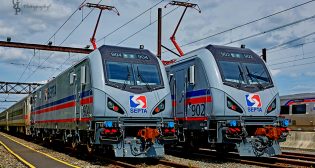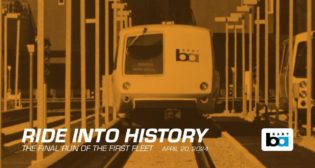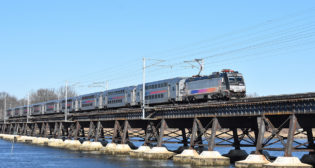
CSR Sifang lands second major U.S. transit car contract
Written by William C. Vantuono, Editor-in-Chief
In the largest single purchase of rapid transit cars in Chicago history, the CTA (Chicago Transit Authority) on March 9, 2016 awarded a $1.31 billion contract to China-based CSR Sifang America Joint Venture for 846 7000 Series cars. CTA will initially purchase a base $632 million order of 400 cars, with options to purchase the remainder in coming years.
The CTA contract is CSR Sifang’s second U.S. contract for transit cars. In 2015, the company won an order for 284 railcars from Boston’s MBTA. CSR Sifang’s bid, according to CTA Vice President Purchasing Ellen McCormick, was $226 million less than the bid submitted by Bombardier, which built CTA’s 5000 Series cars, the final units of which were delivered in November 2015.
In an arrangement similar to its MBTA contract, the Chinese railcar manufacturer has pledged to build a brand-new final assembly plant on Chicago’s Far South Side, “the first of its kind in 35 years.” The facility is expected to generate 170 jobs, and represents an investment of $40 million, according to CSR. In July 2014, Chicago Mayor Rahm Emanuel, the Chicago Federation of Labor and Jobs to Move America announced a partnership to encourage the creation of U.S. manufacturing jobs, by working with CTA to include a “U.S. Employment” provision in the bids for the new 7000 Series cars. The bid solicitation asked bidders to provide the number and type of new jobs they planned to create related to the production of the new railcars, as well as an outline of their job recruitment and workforce training plans. The new plant is expected to be built at 135th Street and Torrence Avenue. Of 24 suppliers, McCormick said 19 have headquarters or facilities in the U.S., 16 of which CTA currently does business with or has previously.
 Prototype 7000s are expected to arrive in 2019. Following testing, the cars will go into service in 2020, at a rate of 10 cars per month. CTA officials said riders will see several major improvements over existing equipment, among them full-width on-board LED screens capable of giving automated time and stop information, and real-time transit information in the event of delays or reroutes. The 7000s will feature more front- and back-facing seats, although front-end seating will still be aisle-facing. This seating configuration, CTA said, “is designed to ensure customer comfort while maximizing passenger flow and capacity. The design was based on studies CTA conducted to solicit feedback from CTA riders on preferences related to seating and design—the first time the CTA has sought rider input on seating layout.”
Prototype 7000s are expected to arrive in 2019. Following testing, the cars will go into service in 2020, at a rate of 10 cars per month. CTA officials said riders will see several major improvements over existing equipment, among them full-width on-board LED screens capable of giving automated time and stop information, and real-time transit information in the event of delays or reroutes. The 7000s will feature more front- and back-facing seats, although front-end seating will still be aisle-facing. This seating configuration, CTA said, “is designed to ensure customer comfort while maximizing passenger flow and capacity. The design was based on studies CTA conducted to solicit feedback from CTA riders on preferences related to seating and design—the first time the CTA has sought rider input on seating layout.”
The cars’ design will incorporate 5000 Series elements—stainless steel carbodies, LED lighting and signage, and AC propulsion.
The 7000 Series cars will replace the CTA’s remaining 2600 Series cars, purchased between 1981 and 1987, according to CTA Vice President Rail Vehicle Maintenance Donald Bonds. When delivery is complete in 2024, CTA will have the newest fleet of rapid transit cars in the nation, said Bonds. He said the average age of a CTA car will be 13 years. By comparison, Boston has an average fleet age of 27 years, Washington, D.C. averages 25 years, New York averages 22 years and San Francisco averages 18 years.
“Providing modern trains and buses is a critical part of having a world-class transit system,” said CTA President Dorval R. Carter, Jr. “This railcar purchase—the largest in CTA history—will give CTA one of the newest fleets in the United States and provide our customers with state-of-the-art trains providing comfortable, reliable rides.”
“It has been more than 30 years since the last railcar rolled off the Pullman assembly line on Chicago’s South Side,” said Chicago Federation of Labor President Jorge Ramirez. “Today’s announcement is the culmination of nearly two years of collaboration with Mayor Emanuel to bring rail car manufacturing back to Chicago where it belongs.”



